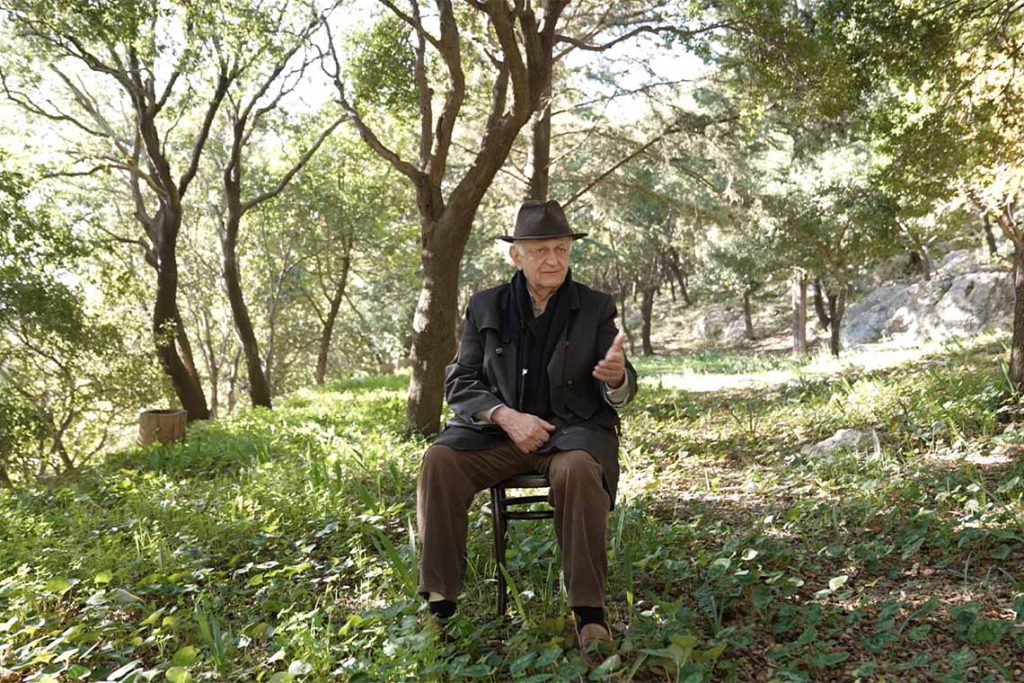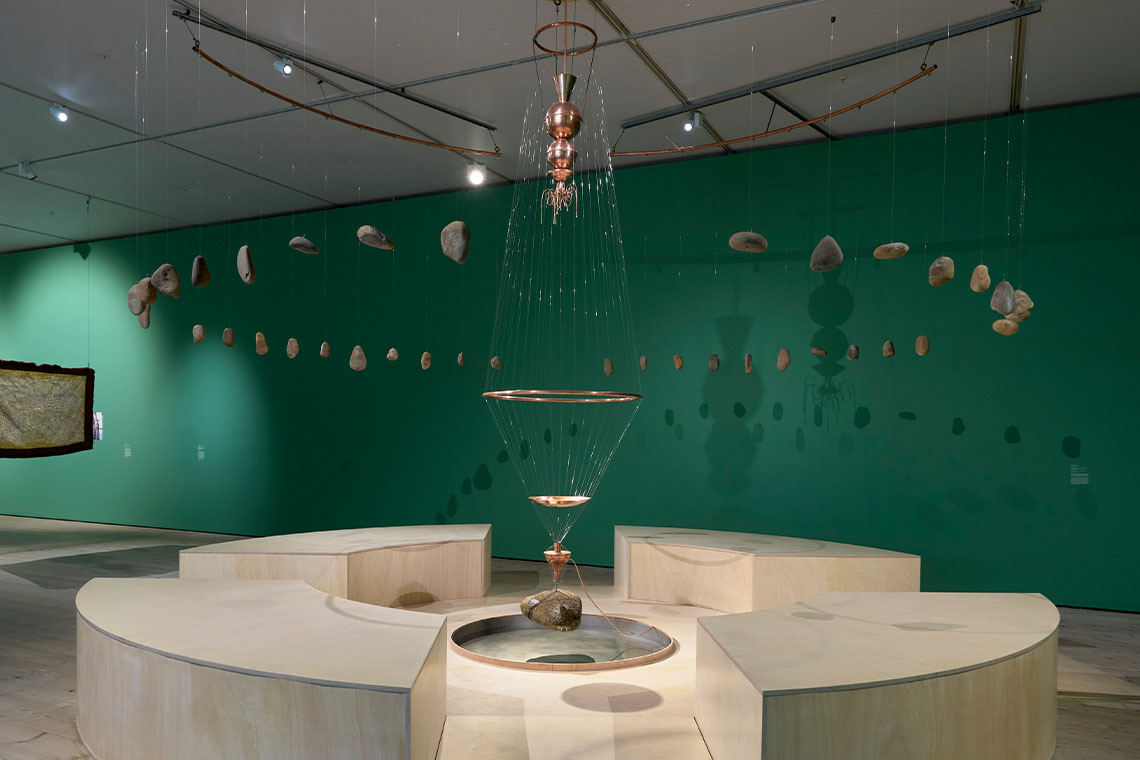Stepping Softly on the Earth at Gateshead’s Baltic Centre for Contemporary Art exalts its audience to tune in more carefully to the world around us and take time to muse on our common predicament.
Templo del agua, río Tyne (Water Temple, River Tyne) (2023),by Colombian artist Leonel Vásquez, borrows rocks and purified water from the River Tyne to make a living sound temporary architecture, a temple to the phenomena at play in water, and an invitation to connect with the element. The work feels emblematic of Stepping Softly on the Earth, an exhibition rooted in the proposal of a shift in perspective from a human-centric worldview to one that “understands the radical interdependence of everything that exists,” according to Vásquez. The amphibious fountain-instrument sits at the centre of a raised platform surrounded by curved benches, on which the audience are invited to sit or lie down to feel the vibrations of droplets of water moving through the sculpture. By relaxing into the meditative setting, the fountain-instrument connects us to the local landscape, and its more-than-human population.
Stepping Softly grew from collaborative effort, through a research project titled ‘Cosmovisions on Land and Entangled Futures’, which facilitated an artist residency in Spain, a research grant in Colombia, and new commissions by Colombian and Mexican artists. After close to two years of development work, where relationships were nurtured, work supported and contributors given the time and space to develop meaningful responses, the exhibition opened as an embodied record of this collective process. In her introduction to the exhibition, co-curator Irene Aristizábal, who curated the show with Kinnari Saraiya, writes: “It proposes to challenge visitors to encounter nature not as a resource to be exploited, but as a living and spiritual entity that is in all beings and unites people beyond borders”.

Featuring work by 20 artists and practitioners, the exhibition is meaningfully rooted in its location at Baltic, and on the River Tyne, while also opening out to broader geographies, particularly those of indigenous communities and the Global South. The show challenges the hegemony of the modern, Western ‘cosmovision’ that positions humans at the centre of existence, and seeks to understand human existence and out relationship to land from a decolonial perspective. The artists in Stepping Softly embrace ancestral tradition, community, processes of transformation and geological time, while also resisting settler-colonialism, redefining our relationship to land and inviting us to imagine other possible worlds.
The gallery space is low-lit and painted a warm green, with a sweep of red fabric in the centre of the room — a curved bench with enclosed carpet and floor cushions invites us to settle to watch a film, work, or simply rest. With the exception of two enclosed film works, the exhibition can be viewed as a whole from multiple perspectives, with no dividing walls or obstructive views, encouraging the audience to understand the show as a group of diverse and connected practices. Cian Dayrit’s tapestries, Entanglements with the entitled extractive establishments (Eeee!) (2022) and To Block the Flow of a River is to Reject the Wisdom of the Earth (2023), utilise the ‘worlding’ language of colonialism persistent in maps and museums to create a counter-cartography embedded in community collaboration, produced in response to protests against a dam project in the Philippines. Dayrit invites people to make their own maps, devoid of territorial demarcations, informed by their own stories and practices, mapping complexity and seeking to dismantle entrenched power structures.
Dayrit’s maps emphasise community over territory, a perspective and practice explored in Marwa Arsanios’s Who is Afraid of Ideology? Part 4, Reverse Shot (2022), which imagines land without ownership through speculative fiction and collaborative research. The first three films in Who Is Afraid of Ideology? document feminist experiments in collective autonomy in Kurdistan, Lebanon and Syria. Reverse Shot (2022) follows Arsanios to a remote private stone quarry in northern Lebanon, where she works with an agricultural collective seeking to communalise the land and improve soil quality. Rural commons, or Al-Mashaa’, emerged as a combination of conceptions of Islamic property and customary practices of communal or tribal land. They exist as long as people are collectively cultivating land, and as soon as that work ceases, the collective loses possession.

The urgency of Arsanios’s proposal to reverse the legal status from land ownership to land usership, from a relationship of commodity to one of care, can be seen through Solmaz Daryani’s The Eyes of the Earth (The Death of Lake Urmia) (2014–ongoing), which narrates the environmental tragedy unfolding at Lake Urmia in Iran through the lens of her childhood spent on its shores. Once the second largest saltwater lake in the world, Lake Urmia has been disappearing over the last 50 years due to drought, over-extraction for agriculture and dam construction. For Daryani, this has meant watching the demise of the teahouses that were once filled with people, and her grandfather’s formerly bustling lakeside hotel – the swan pedalos now in a long sleep on the shore. The Eyes of the Earth conveys the complexity of how socio-political and ecological issues overlap, zooming in on Daryani’s personal experience in order to zoom out on the bigger picture impact of time and urban development on both individuals and landscapes.
A (Rough) Seasonal Work Song (2023) by Tizintizwa – a poly-disciplinary art-research practice by Nadir Bouhmouch and Soumeya Ait Ahmed – is a portrait of an apple crop in the Atlas Mountains; narrated by Fadma Boutalaa, an agricultural worker and troubadour who is going to work on an apple harvest. The video contrasts the soil poverty of monocultural agriculture with the richness of the oral traditions of agricultural workers with their work songs, tales and legends. It shows how these traditions have been passed down through generations, helping labourers with their tasks while sharing stories of their connection to the land and their resistance to oppression. At one point in the film, we listen as Fadma speaks with her friend on the bus about how there is no work as a troubadour, only apple harvesting, during which they continue the tradition of ancestral work songs and convey the pride farmers take in their labour through spiritual pleas for fair wages. We watch from a distance as the bus hugs the mountain landscape, with Fadma narrating the scene: “We have to keep singing”.



